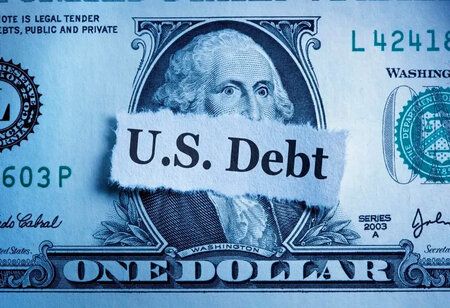By Global Consultants Review Team
 The U.S. government recorded a federal deficit of just over $316 billion in May, pushing the total shortfall for the fiscal year so far to $1.36 trillion, according to the latest report from the Treasury Department. The growing gap between spending and revenue comes despite a temporary surplus in April, fueled by annual tax season inflows.
The U.S. government recorded a federal deficit of just over $316 billion in May, pushing the total shortfall for the fiscal year so far to $1.36 trillion, according to the latest report from the Treasury Department. The growing gap between spending and revenue comes despite a temporary surplus in April, fueled by annual tax season inflows.
Driving the worsening fiscal picture are sharply rising interest payments on the national debt, which now stands at $36.2 trillion. In May alone, interest costs reached $92 billion, making debt servicing the third-largest federal expense after Medicare and Social Security. Over the first eight months of the fiscal year, interest payments have totaled $776 billion, putting the government on track to spend over $1.2 trillion on financing its debt by year-end.
While May’s deficit was 9% lower than the same month last year, the cumulative deficit is still running 14% higher than at this point in 2024. Economists warn that the persistent imbalance is increasingly unsustainable, especially in a time of relative economic stability, with the deficit now exceeding 6% of GDP, a level typically seen during wartime or economic crises.
Revenue has been one of the few bright spots. Tax receipts climbed 15% in May and are up 6% compared to a year ago. Tariff collections also contributed, surging to $23 billion for the month, a steep rise from $6 billion in May 2024. For the fiscal year, tariff revenues stand at $86 billion, a 59% increase from last year, fueled in part by President Donald Trump’s recent "liberation day" tariff policy announcement in April.
Despite revenue gains, government spending continues to rise, with expenditures up 2% in May and 8% year-over-year. At the same time, Treasury yields have remained elevated, with the 10-year yield hovering around 4.4%, largely unaffected by Federal Reserve rate cuts earlier in the year.
The ballooning debt and deficit have drawn concern from prominent Wall Street figures. JPMorgan Chase CEO Jamie Dimon, BlackRock’s Larry Fink, and Bridgewater founder Ray Dalio have all cautioned about the risks of continued fiscal imbalances, warning of potential economic instability if the U.S. fails to rein in spending or restructure its debt management strategy.
As the federal government barrels toward another trillion-dollar deficit year, pressure is mounting in Washington to address the fiscal trajectory before it sparks deeper consequences for the economy.
We use cookies to ensure you get the best experience on our website. Read more...